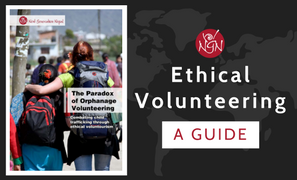At NGN we applaud everyone who wishes to donate their time and skills to help others less fortunate than themselves. However, choosing an “ethical volunteering” placement in a developing country is something that takes careful consideration.
“Ethical volunteering” means two things:
1) volunteering with the right mindset; and,
2) taking the time and care to choose a placement that does not cause harm to others.
To help you do this, here are NGN’s seven tips for ethical volunteering:
1. Do not volunteer in an “orphanage”
Orphanage volunteering in developing countries is, for the most part, not an ethical option. “Orphanages” in countries like Nepal are not the same as orphanages in the West, and most often, the children will have one or both parents still alive (they are not true orphans). The demand for volunteering placements in “orphanages” in Nepal is actually fueling child trafficking and keeping children away from their families. The traffickers have realized that there is a great deal of money to be made from kind foreigners who want to help by volunteering in “orphanages.” Setting up an “orphanage” is easy for the traffickers, with children readily available from poor, uneducated families who do not understand where their children are going. “Orphanages” have become lucrative, profit-making businesses to meet the needs of volunteers—and not the needs of the children! Volunteering in “orphanages” can also create long-term psychological problems for the children. They get attached to volunteers who then leave, over and over again, each time causing grief for a child, and it leaves the children at risk of physical and sexual abuse. Orphanage volunteering is suitable for only a few volunteers who have the professional skills to do so (social workers, psychologists and so on) and, even then, there are only a few orphanages in Nepal at which NGN would consider it ethical to volunteer at (see the FAQs below).
For more information about the links between orphanage trafficking and orphanage volunteering, see the following:
- Ethical Volunteering in Nepal
How to Protect Vulnerable Children While “Giving Back” - The Paradox of Orphanage Volunteering
Combating child trafficking through ethical voluntourism - NGN’s Wisdom Wednesdays
Martin Punaks, former NGN Country Director
2. Before volunteering, adopt a “learning mindset”
This means readjusting your whole approach toward volunteering and recognizing that you first need to learn from those you wish to help. Only by understanding their lives and the problems they are facing will you know whether or not you are in a position to help them. Maybe there will be something useful you can do to support them, but maybe you will realize that—at this point in time—you are not able to offer much. Even if you find that you are not able to offer help now, the learning you will get from spending time with local people will give you valuable knowledge, and make you a kinder and wiser person. It will open your mind to different cultural perspectives and make you more sensitive to disadvantage in the world, in your own society and in others. Learning before helping is not selfish; it means that when you do give help to others, it will be focused and effective at really making a difference. This is the bedrock of being a responsible global citizen. For more information about this approach, see: www.learningservice.info.
3. Research ethical volunteering options thoroughly
Choosing an ethical volunteering placement requires research and thoughtfulness. If an individual is serious about wanting to help people less fortunate than themselves—and not inadvertently harming people—then these websites are a good place to begin your research:
- Better Volunteering Better Care
- Tourism Concern
- LearningService.info
- Globalsl.org
- The ChildSafe Network
- Orphanages Not the Solution
- ACCI Child Protection on Short Term Missions Manual
- United States of America travel advice
- British travel advice
- French travel advice
- Swiss travel advice
- Danish Embassy statement on orphanage volunteering
- Australian Travel Advice
4. Consider the suitability of your skills
You should consider your own skill set and how this can be best utilized for the benefit of a community. For example, if you have skills in developing websites in your own country, then you may be able to support NGOs in another country to do the same. Being a website designer does not mean that you are suddenly qualified to be able to care for traumatized children in an orphanage, but there are many NGOs in Nepal that would love you to spend a few days of your time helping them!
5. Consider the sustainability of the project you want to work on
You should consider the long-term sustainable impact of your volunteer placement. This means:
- Avoid accepting voluntourism placements that prevent a local person from doing the same job, as this defeats the point of volunteering;
- Consider how you can try and use your skills to train local people so that after you leave a local person can become the “change-maker” in their own community. This empowers local people and removes the need for a volunteer in the future, which means that your volunteering placement will have been a huge success for everyone;
- Consider whether or not, or how well, your activities can make a long-term impact, rather than a short-term impact. For example, if a group of foreigners dig a well in a village without any local people being involved, then the local people may not feel ownership of the well and when it degrades or becomes broken, nobody locally will know how to repair it; but, if local people are involved in the well’s construction from the onset, they may feel more ownership over it and will understand better how to fix it after the foreigners have gone; and
- In relation to children, try to support projects that: 1) encourage children to remain with their own families, rather being made to leave or stay away from their families and communities; 2) help poor and rural communities grow into economically thriving places where people want to stay and have prosperous lives; 3) help poor and rural communities improve their livelihoods and educational systems, so children do not need to leave their families and community to seek an education elsewhere.
6. Ask the volunteer agency lots of questions
Before choosing a volunteer placement, you should ask probing questions to the volunteer or tourist agency that is arranging your placement. If the agency cannot satisfactorily answer questions about the safety of the children, sustainability and local empowerment, as discussed above, then these agencies may be more oriented towards profit than social change. You would be advised to avoid these sorts of agencies as this will increase the market demand for ethical and socially oriented volunteering. NGN strongly recommends you read the helpful toolkit, Learning Service: Tips and Tricks for Learning Before Helping, on the Learning Service website to support you with this (see www.learningservice.info).
7. Be an ethical tourist
If you are unable to find an ethical volunteering placement, or if it all just seems too complicated to research and organize, then NGN would simply advise you to enjoy being an ethical tourist. Ethical tourism means spending money on services and goods that support local people and the local economy. It involves putting some time aside to talk with local people and learn about their lives and interests. Equally, it involves talking with local people and sharing information about your own life and interests. If appropriate, and if a local person requests it, you could help a local person with their English-language skills or other small tasks, for example, by helping them write an English-language brochure for their small business. Most of all, an ethical tourist recognizes that they, and the local person with whom they are engaging, both have equal amounts of valuable knowledge to contribute to each other. Through this honest and sincere cultural transaction, both parties will benefit, and so will the broader society.
A final word of advice from NGN is to always research the current legal status of volunteering in specific countries, and the type of visa or permit required to enable you to volunteer legally (NGN accepts no responsibility for any individuals who choose to volunteer in Nepal or any other country).
Good luck!





